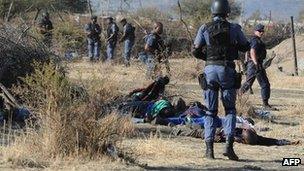Marikana murder charges: South Africa minister wants explanation
- Published

South Africa's justice minister has demanded an explanation after 270 miners were charged with the murder of their colleagues who were shot by police.
The decision had "induced a sense of shock, panic and confusion" among South Africans, Jeff Radebe said.
State prosecutors charged the miners under the apartheid-era "common purpose" doctrine.
The decision has already been condemned by constitutional lawyers.
A group of lawyers representing the 270 miners wrote to President Jacob Zuma, demanding the release of their clients by 13:00 on Sunday.
Otherwise, the lawyers warned that they would apply to the high court to order the miners' release.
In a separate development, the country's independent police watchdog has refused to comment on reports citing leaked details of post-mortem examinations suggesting miners were shot in the back.
'Outdated and infamous'
In a statement, Mr Radebe said that under the constitution, the justice minister "must exercise final responsibility over the prosecuting authority".
He said he had therefore asked the head of the National Prosecuting Authority (NPA) "to furnish me with a report explaining the rationale behind such a decision".
Police shot dead 34 miners two weeks ago during a strike at the Marikana mine, owned by Lonmin, the world's third largest platinum producer, sparking a national outcry.
Police said they opened fire after being threatened by a crowd of protesters who advanced towards them, armed with machetes.
The 270 miners, six of whom remain in hospital, were arrested during the protests.
They were charged on Thursday, with the prosecutors arguing they were part of the crowd whose actions provoked the police into opening fire.
Former African National Congress (ANC) youth leader Julius Malema condemned the decision as "madness".
"The policemen who killed those people are not in custody, not even one of them. This is madness," said Mr Malema, who was expelled from the ANC earlier this year following a series of disagreements with President Jacob Zuma.
South African lawyer Jay Surju told the BBC's Focus on Africa programme that the "common purpose" doctrine was "outdated and infamous".
"It was discredited during the time of apartheid."
Constitutional lawyer Pierre de Vos also condemned the murder charges as "a flagrant abuse of of the criminal justice system".
The best known case of the use "common purpose" doctrine was that of the "Upington 14", who were sentenced to death in 1989 for the murder of a policeman.
The trial judge convicted the 14 activists, even though he acknowledged that they did not carry out the killing.
Anti-apartheid activists around the world protested against the ruling, which was overturned on appeal.
No police officers have been charged over the deaths of the 34 miners because a judicial inquiry and an internal police review are under way, but these are expected to take several months to complete.
The strike turned violent before the police shooting with the deaths of 10 people, including two police officers and two security guards, who were hacked to death.
The protests were triggered by demands for a huge pay rise and recognition of a new union.
Talks are continuing to resolve the dispute, which has shut the mine for the past three weeks.
- Published24 August 2012
- Published23 August 2012
- Published23 August 2012
- Published23 August 2012
- Published20 August 2012
- Published19 August 2012
- Published16 August 2012
- Published17 August 2012
- Published24 July 2023